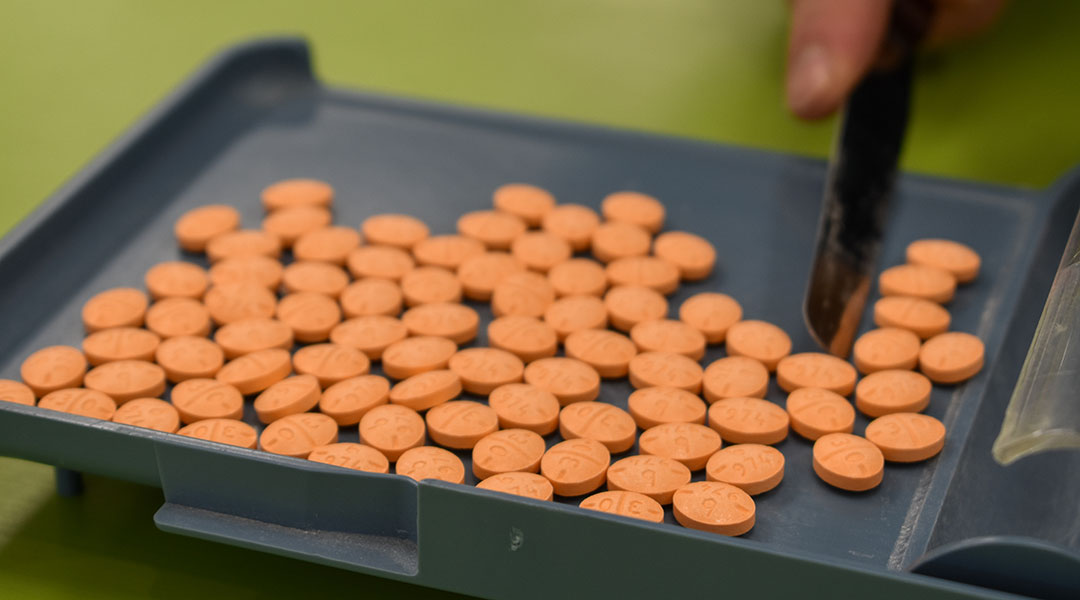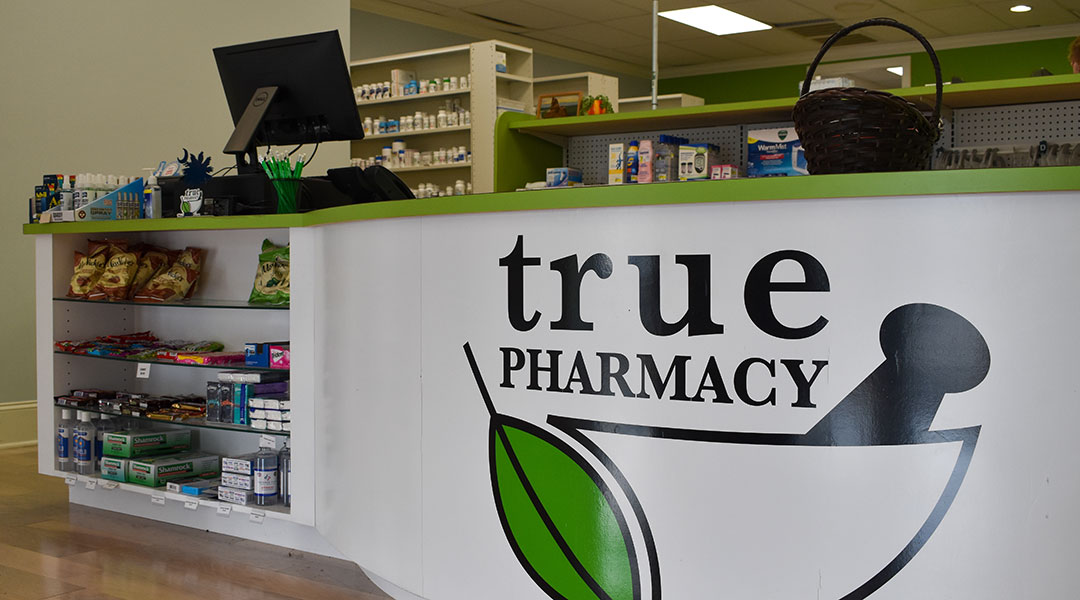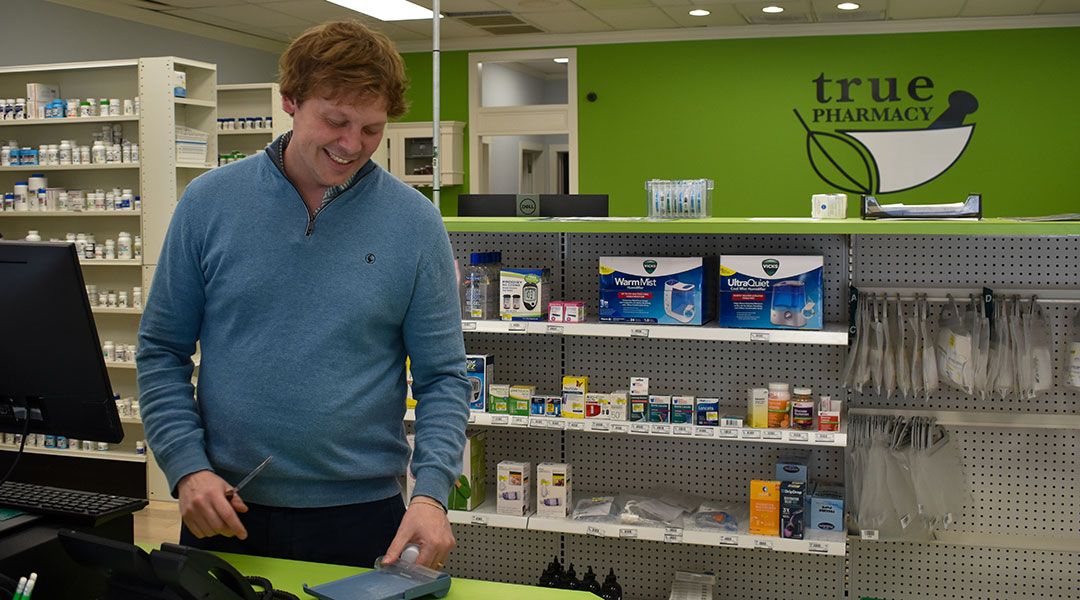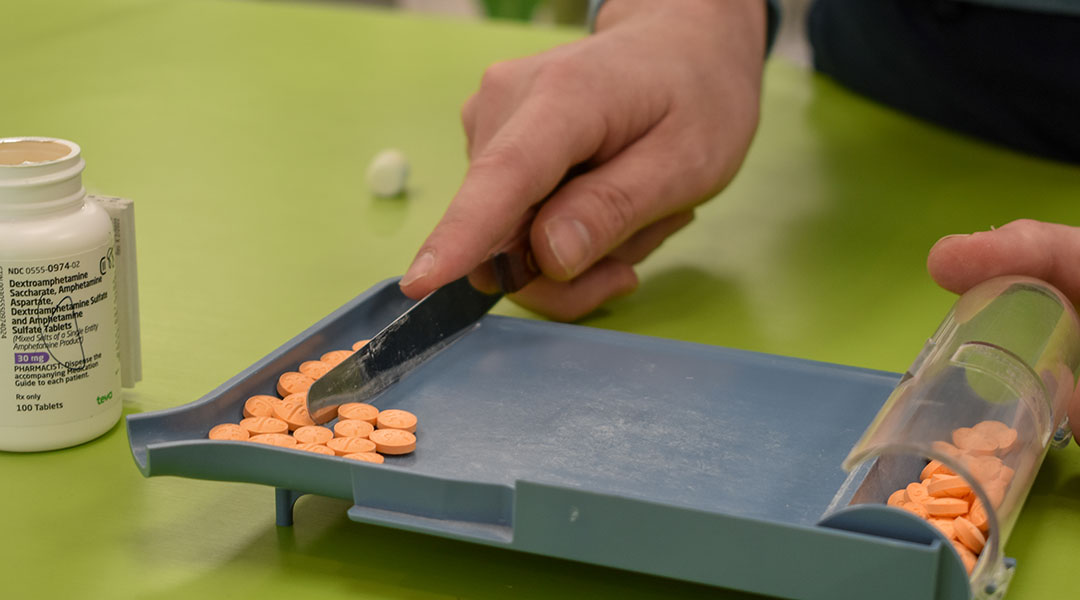The Food and Drug Administration announced in October that the nation was experiencing a nationwide Adderall shortage. The dosages in highest demand as of February were the 10-, 15- and 20-milligram pills. (Photos by Emily Okon)
The ongoing shortage of Adderall has left Columbia-area patients anxious as they attempt to fill prescriptions that seem to be unavailable.
The shortage began in October when the Food and Drug Administration announced that the country would be in short supply of the drug used to treat ADHD.
Physicians and patients have tried to switch medications. But most alternatives are expensive or unavailable.
Meredyth Griffith, a pharmacy technician in Columbia, began to notice the shortfall last May.
“It lasted for probably about a month in May, and then it was OK,” Griffith said. “We really started to notice it come about September, and it was pretty bad. It’s been pretty bad since about October.”
Shortages have been caused by a variety of chain-reaction events.
Manufacturing delays from companies such as Teva Pharmaceuticals have been cited as one of the primary causes.
Shortages in the pharmacies
The shortage is affecting more than just one Columbia pharmacy.
True Pharmacy has been hit hard because it primarily serves college students.
“It’s a common drug, and this is Columbia,” said John Thorne, a pharmacist at True Pharmacy. “We’re a college town. We have lots of students who need this drug to focus.”
Roughly 1 in 9 college students have ADHD, or attention deficit and hyper-activity disorder, according to a 2020 study from the American College Health Association.
There are few studies on post-pandemic ADHD diagnoses. But it is expected that the percentage of college students diagnosed has increased.
Demand for Adderall has increased since the world of healthcare changed dramatically to accommodate social distancing in 2020.
Telehealth kept patients out of healthcare facilities that were crowded with COVID cases.
That allowed primary-care physicians, rather than specialists, to prescribe controlled substances without an in-person consultation.
Pharmaceutical production companies also have faced an increase in patients who need the drug.
“Teva, the main producer of (Adderall) is undergoing some structural and production changes, and that’s slowed down their ability to produce it,” Thorne said.
The shortage was initially due to manufacturing errors, but the high demand seems to be the driving cause, the FDA said in an email to the Carolina News & Reporter.
The FDA said it has been in contact with Teva Pharmaceuticals to monitor the overall availability of this drug.
Pharmacies across Richland and Lexington counties have experienced the shortage but declined to comment on their experiences.
Brands and generic names
Adderall is a brand name for the chemical compound known as amphetamine.
Regardless of the name, each version of the drug has the same chemical compound.
Adderall’s brand isn’t the only ADHD medication in short supply. Adderall’s generic, plus alternatives for the drug as well as their generics, have been affected, too.
Still, most insurance companies only cover generic forms of medications because of the price.
“The name brands are more readily available,” Thorne said. “But the brands are really, really expensive.”
Vyvanse can cost anywhere from $300 to $450 without insurance.
There is no generic Vyvanse available, and because of that most insurance companies refuse to cover the cost.
The FDA expects a generic form of Vyvanse to appear on the market in late 2023 after the producer’s patent has expired.
ADHD without medication
Meredyth Griffith isn’t just a pharmacy technician. She’s also a student at the University of South Carolina who has been diagnosed with ADHD.
She initially was prescribed Concerta when she was diagnosed in 2021.
She switched to Vyvanse at the beginning of the shortage after switching to an insurance policy that covers the drug.
Griffith is hoping to switch to a different brand soon.
“Vyvanse is a drug that some people can develop a tolerance to pretty quickly,” She said. “I have started increasing the dosage of it way too frequently, more than I would prefer to. I want to try to wean off of it because I would prefer to not take this for the rest of my life.”
Others haven’t been as fortunate.
Binnaz Bailey is the associate director of environmental health and safety at the University of Southern Mississippi and was diagnosed with ADHD six years ago.
She only has taken the generic brand of Adderall.
Bailey had trouble getting her prescription filled late last year and was forced to go nearly a week without her medication.
She has had a bit of luck recently getting her prescription filled. But that’s not always the case.
Bailey set out just a week ago to refill her prescription for 40 milligrams a day. She was finally able to fill it, but not without making countless phone calls.
“My doctor did not consult with me first,” Bailey said. “He immediately sent a script in for Vyvanse, which is not covered in my formulary. Then he tried to send a script in for Ritalin, and Walmart couldn’t get Ritalin. Eventually, I found out that they could not get any drug related to ADHD.”
Bailey’s days without her medication were some of the worst days she’s ever had.
“I have a hard time getting out of the bed, getting up in the morning and getting to work,” she said. “It’s near to impossible. … It makes you do the bare minimum.”
With a family to care for, and a job that requires an immense amount of focus, going without her medication is detrimental to her and her surroundings, she said.
Telehealth, diagnoses and prescriptions
While a variety of physicians can diagnose ADHD, a prescription can only be written by psychiatrists, neurologists and primary care providers.
With treatment only a tap away, ADHD diagnoses have surged in the past two years.
But cases really have been surging for eight years, according to BlueCross BlueShield.
ADHD is the second-most impactful condition affecting children in the United States, the insurance company said in its 2019 report.
Prior to the shortage, a typical patient would be prescribed a daily dosage of 20 or 30 milligrams of the drug. Now, those pills are the hardest to get.
Physicians have tried to accommodate this need by switching patients to 10 milligrams multiple times a day to meet the needs.
Carolina News & Reporter reached out to Prisma Health, the state’s largest medical care provider, on the issue. But it declined to comment.
Is there an end in sight?
There is no answer to whether we will see an end to the shortage in the coming months.
But pharmacies and the FDA are hopeful.
“The FDA recognizes the potential impact that reduced availability of certain products may have on health care providers and patients,” said FDA Press Officer Chanapa Tantibanchachai, in an email to Carolina News & Reporter.
“Rest assured the FDA is working closely with numerous manufacturers and others in the supply chain to understand, mitigate and prevent or reduce the impact of intermittent or reduced availability of certain products,” Tantibanchachai said.
Patients hope she’s right.
“It’ll eventually get back to normal, but it’s gonna take time,” Griffith said.
True Pharmacy is located on Devine Street in Columbia. It serves the city’s diverse population but primarily caters to college students because of its location.
John Thorne, a pharmacist at True Pharmacy, demonstrates how he sorts and counts pills. Thorne graduated from the University of South Carolina College of Pharmacy in 2019.
Thorne counts 30 milligram pills of Adderall. The wholesale bottle has a total of 100 capsules, enough to last two or three months.





